Strategic Analysis: Australia's Success in the Wine Industry, Report
VerifiedAdded on 2021/04/17
|5
|1157
|29
Report
AI Summary
This report provides a strategic analysis of the Australian wine industry, highlighting the factors contributing to its success. The analysis emphasizes the importance of quality and integrity, knowledge development through research and innovation, and effective market development strategies. The report contrasts the Australian approach with that of the French wine industry, suggesting that the French can regain their market position by focusing on tax breaks, strict quality control, mergers, and innovation. The Australian wine industry's success is attributed to its focus on value, research, and proactive market expansion, including open policies that have facilitated growth in diverse markets. The report also offers actionable advice to French wine producers, focusing on regaining their competitive edge through strategic improvements in quality, innovation, and marketing.
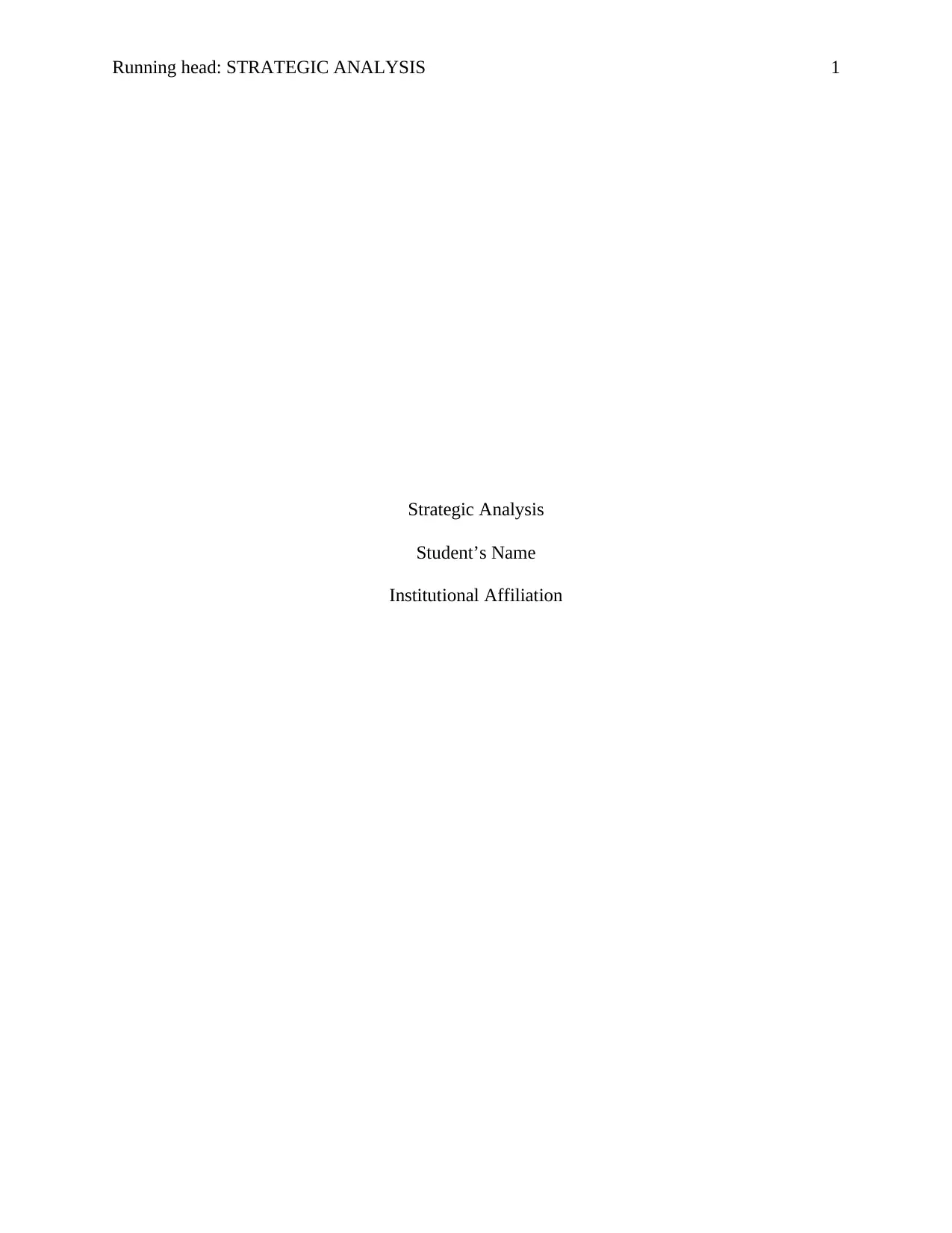
Running head: STRATEGIC ANALYSIS 1
Strategic Analysis
Student’s Name
Institutional Affiliation
Strategic Analysis
Student’s Name
Institutional Affiliation
Paraphrase This Document
Need a fresh take? Get an instant paraphrase of this document with our AI Paraphraser
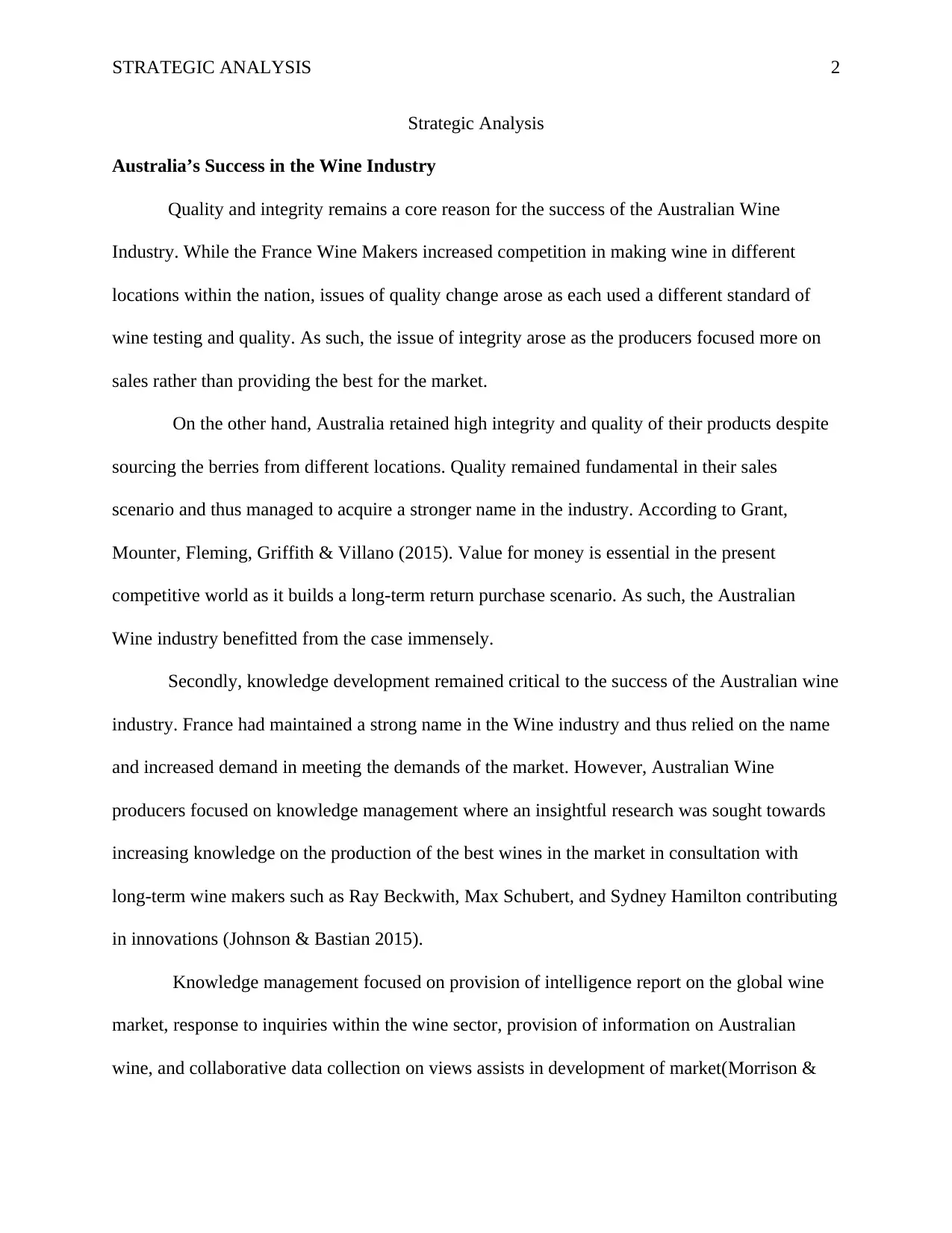
STRATEGIC ANALYSIS 2
Strategic Analysis
Australia’s Success in the Wine Industry
Quality and integrity remains a core reason for the success of the Australian Wine
Industry. While the France Wine Makers increased competition in making wine in different
locations within the nation, issues of quality change arose as each used a different standard of
wine testing and quality. As such, the issue of integrity arose as the producers focused more on
sales rather than providing the best for the market.
On the other hand, Australia retained high integrity and quality of their products despite
sourcing the berries from different locations. Quality remained fundamental in their sales
scenario and thus managed to acquire a stronger name in the industry. According to Grant,
Mounter, Fleming, Griffith & Villano (2015). Value for money is essential in the present
competitive world as it builds a long-term return purchase scenario. As such, the Australian
Wine industry benefitted from the case immensely.
Secondly, knowledge development remained critical to the success of the Australian wine
industry. France had maintained a strong name in the Wine industry and thus relied on the name
and increased demand in meeting the demands of the market. However, Australian Wine
producers focused on knowledge management where an insightful research was sought towards
increasing knowledge on the production of the best wines in the market in consultation with
long-term wine makers such as Ray Beckwith, Max Schubert, and Sydney Hamilton contributing
in innovations (Johnson & Bastian 2015).
Knowledge management focused on provision of intelligence report on the global wine
market, response to inquiries within the wine sector, provision of information on Australian
wine, and collaborative data collection on views assists in development of market(Morrison &
Strategic Analysis
Australia’s Success in the Wine Industry
Quality and integrity remains a core reason for the success of the Australian Wine
Industry. While the France Wine Makers increased competition in making wine in different
locations within the nation, issues of quality change arose as each used a different standard of
wine testing and quality. As such, the issue of integrity arose as the producers focused more on
sales rather than providing the best for the market.
On the other hand, Australia retained high integrity and quality of their products despite
sourcing the berries from different locations. Quality remained fundamental in their sales
scenario and thus managed to acquire a stronger name in the industry. According to Grant,
Mounter, Fleming, Griffith & Villano (2015). Value for money is essential in the present
competitive world as it builds a long-term return purchase scenario. As such, the Australian
Wine industry benefitted from the case immensely.
Secondly, knowledge development remained critical to the success of the Australian wine
industry. France had maintained a strong name in the Wine industry and thus relied on the name
and increased demand in meeting the demands of the market. However, Australian Wine
producers focused on knowledge management where an insightful research was sought towards
increasing knowledge on the production of the best wines in the market in consultation with
long-term wine makers such as Ray Beckwith, Max Schubert, and Sydney Hamilton contributing
in innovations (Johnson & Bastian 2015).
Knowledge management focused on provision of intelligence report on the global wine
market, response to inquiries within the wine sector, provision of information on Australian
wine, and collaborative data collection on views assists in development of market(Morrison &
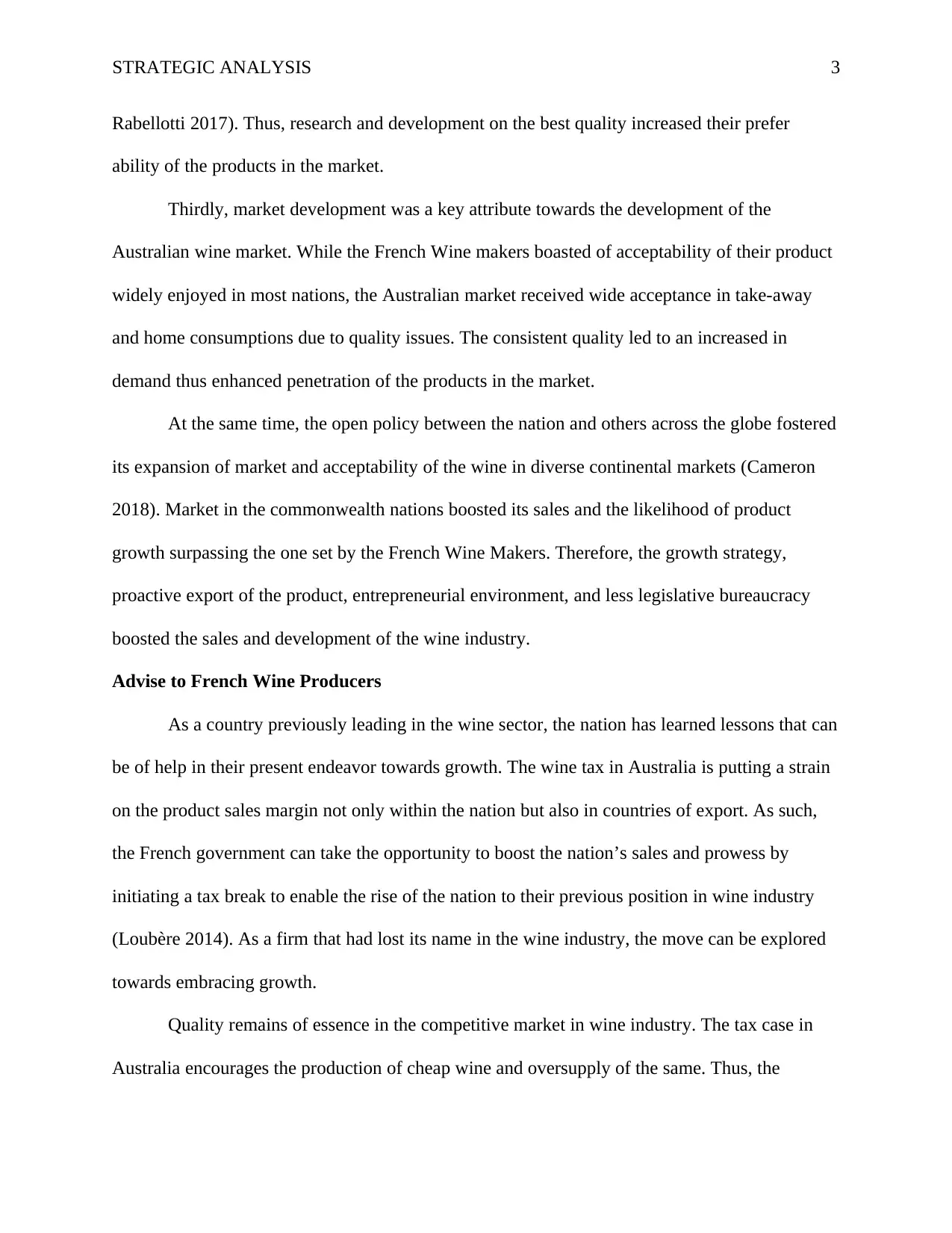
STRATEGIC ANALYSIS 3
Rabellotti 2017). Thus, research and development on the best quality increased their prefer
ability of the products in the market.
Thirdly, market development was a key attribute towards the development of the
Australian wine market. While the French Wine makers boasted of acceptability of their product
widely enjoyed in most nations, the Australian market received wide acceptance in take-away
and home consumptions due to quality issues. The consistent quality led to an increased in
demand thus enhanced penetration of the products in the market.
At the same time, the open policy between the nation and others across the globe fostered
its expansion of market and acceptability of the wine in diverse continental markets (Cameron
2018). Market in the commonwealth nations boosted its sales and the likelihood of product
growth surpassing the one set by the French Wine Makers. Therefore, the growth strategy,
proactive export of the product, entrepreneurial environment, and less legislative bureaucracy
boosted the sales and development of the wine industry.
Advise to French Wine Producers
As a country previously leading in the wine sector, the nation has learned lessons that can
be of help in their present endeavor towards growth. The wine tax in Australia is putting a strain
on the product sales margin not only within the nation but also in countries of export. As such,
the French government can take the opportunity to boost the nation’s sales and prowess by
initiating a tax break to enable the rise of the nation to their previous position in wine industry
(Loubère 2014). As a firm that had lost its name in the wine industry, the move can be explored
towards embracing growth.
Quality remains of essence in the competitive market in wine industry. The tax case in
Australia encourages the production of cheap wine and oversupply of the same. Thus, the
Rabellotti 2017). Thus, research and development on the best quality increased their prefer
ability of the products in the market.
Thirdly, market development was a key attribute towards the development of the
Australian wine market. While the French Wine makers boasted of acceptability of their product
widely enjoyed in most nations, the Australian market received wide acceptance in take-away
and home consumptions due to quality issues. The consistent quality led to an increased in
demand thus enhanced penetration of the products in the market.
At the same time, the open policy between the nation and others across the globe fostered
its expansion of market and acceptability of the wine in diverse continental markets (Cameron
2018). Market in the commonwealth nations boosted its sales and the likelihood of product
growth surpassing the one set by the French Wine Makers. Therefore, the growth strategy,
proactive export of the product, entrepreneurial environment, and less legislative bureaucracy
boosted the sales and development of the wine industry.
Advise to French Wine Producers
As a country previously leading in the wine sector, the nation has learned lessons that can
be of help in their present endeavor towards growth. The wine tax in Australia is putting a strain
on the product sales margin not only within the nation but also in countries of export. As such,
the French government can take the opportunity to boost the nation’s sales and prowess by
initiating a tax break to enable the rise of the nation to their previous position in wine industry
(Loubère 2014). As a firm that had lost its name in the wine industry, the move can be explored
towards embracing growth.
Quality remains of essence in the competitive market in wine industry. The tax case in
Australia encourages the production of cheap wine and oversupply of the same. Thus, the
⊘ This is a preview!⊘
Do you want full access?
Subscribe today to unlock all pages.

Trusted by 1+ million students worldwide
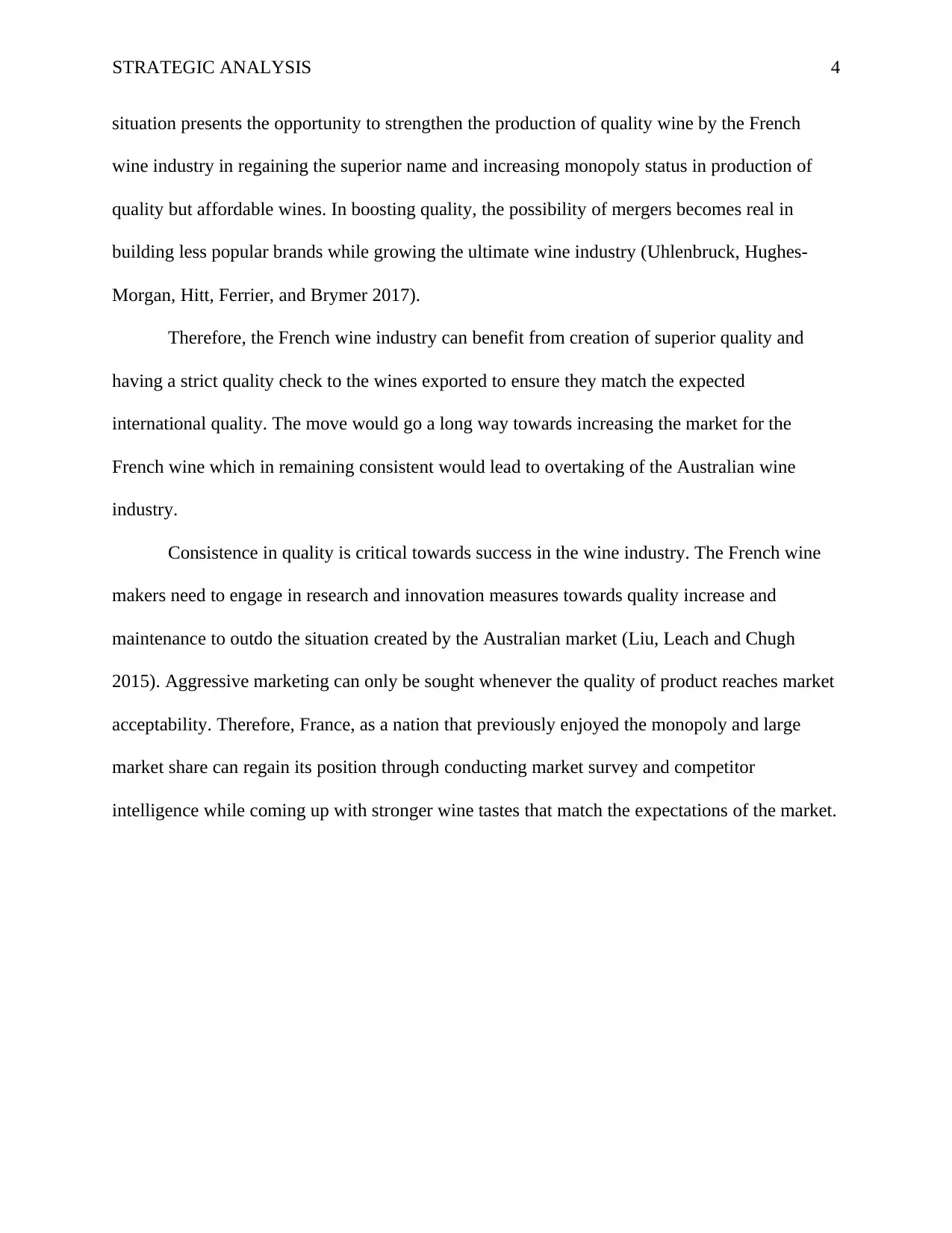
STRATEGIC ANALYSIS 4
situation presents the opportunity to strengthen the production of quality wine by the French
wine industry in regaining the superior name and increasing monopoly status in production of
quality but affordable wines. In boosting quality, the possibility of mergers becomes real in
building less popular brands while growing the ultimate wine industry (Uhlenbruck, Hughes-
Morgan, Hitt, Ferrier, and Brymer 2017).
Therefore, the French wine industry can benefit from creation of superior quality and
having a strict quality check to the wines exported to ensure they match the expected
international quality. The move would go a long way towards increasing the market for the
French wine which in remaining consistent would lead to overtaking of the Australian wine
industry.
Consistence in quality is critical towards success in the wine industry. The French wine
makers need to engage in research and innovation measures towards quality increase and
maintenance to outdo the situation created by the Australian market (Liu, Leach and Chugh
2015). Aggressive marketing can only be sought whenever the quality of product reaches market
acceptability. Therefore, France, as a nation that previously enjoyed the monopoly and large
market share can regain its position through conducting market survey and competitor
intelligence while coming up with stronger wine tastes that match the expectations of the market.
situation presents the opportunity to strengthen the production of quality wine by the French
wine industry in regaining the superior name and increasing monopoly status in production of
quality but affordable wines. In boosting quality, the possibility of mergers becomes real in
building less popular brands while growing the ultimate wine industry (Uhlenbruck, Hughes-
Morgan, Hitt, Ferrier, and Brymer 2017).
Therefore, the French wine industry can benefit from creation of superior quality and
having a strict quality check to the wines exported to ensure they match the expected
international quality. The move would go a long way towards increasing the market for the
French wine which in remaining consistent would lead to overtaking of the Australian wine
industry.
Consistence in quality is critical towards success in the wine industry. The French wine
makers need to engage in research and innovation measures towards quality increase and
maintenance to outdo the situation created by the Australian market (Liu, Leach and Chugh
2015). Aggressive marketing can only be sought whenever the quality of product reaches market
acceptability. Therefore, France, as a nation that previously enjoyed the monopoly and large
market share can regain its position through conducting market survey and competitor
intelligence while coming up with stronger wine tastes that match the expectations of the market.
Paraphrase This Document
Need a fresh take? Get an instant paraphrase of this document with our AI Paraphraser
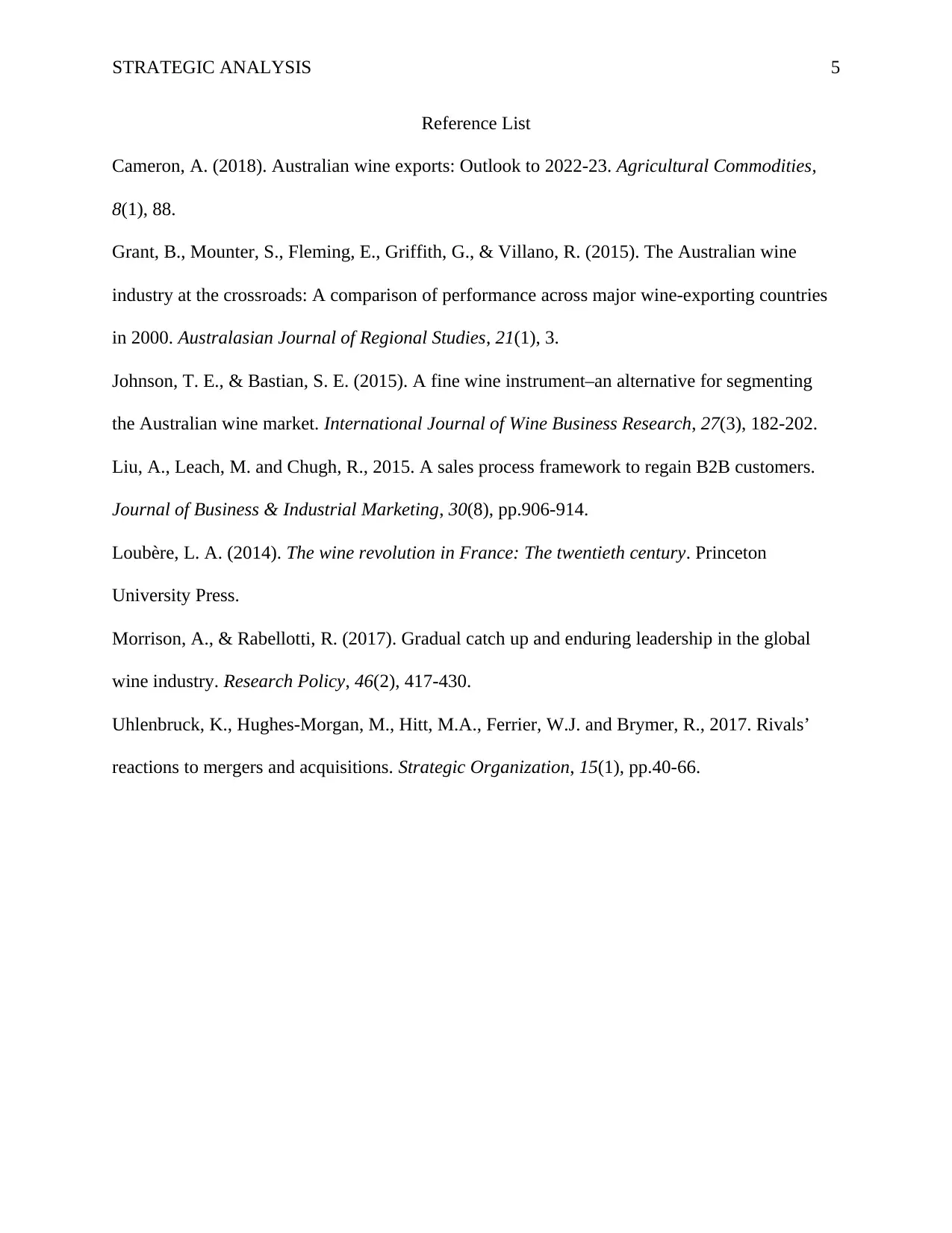
STRATEGIC ANALYSIS 5
Reference List
Cameron, A. (2018). Australian wine exports: Outlook to 2022-23. Agricultural Commodities,
8(1), 88.
Grant, B., Mounter, S., Fleming, E., Griffith, G., & Villano, R. (2015). The Australian wine
industry at the crossroads: A comparison of performance across major wine-exporting countries
in 2000. Australasian Journal of Regional Studies, 21(1), 3.
Johnson, T. E., & Bastian, S. E. (2015). A fine wine instrument–an alternative for segmenting
the Australian wine market. International Journal of Wine Business Research, 27(3), 182-202.
Liu, A., Leach, M. and Chugh, R., 2015. A sales process framework to regain B2B customers.
Journal of Business & Industrial Marketing, 30(8), pp.906-914.
Loubère, L. A. (2014). The wine revolution in France: The twentieth century. Princeton
University Press.
Morrison, A., & Rabellotti, R. (2017). Gradual catch up and enduring leadership in the global
wine industry. Research Policy, 46(2), 417-430.
Uhlenbruck, K., Hughes-Morgan, M., Hitt, M.A., Ferrier, W.J. and Brymer, R., 2017. Rivals’
reactions to mergers and acquisitions. Strategic Organization, 15(1), pp.40-66.
Reference List
Cameron, A. (2018). Australian wine exports: Outlook to 2022-23. Agricultural Commodities,
8(1), 88.
Grant, B., Mounter, S., Fleming, E., Griffith, G., & Villano, R. (2015). The Australian wine
industry at the crossroads: A comparison of performance across major wine-exporting countries
in 2000. Australasian Journal of Regional Studies, 21(1), 3.
Johnson, T. E., & Bastian, S. E. (2015). A fine wine instrument–an alternative for segmenting
the Australian wine market. International Journal of Wine Business Research, 27(3), 182-202.
Liu, A., Leach, M. and Chugh, R., 2015. A sales process framework to regain B2B customers.
Journal of Business & Industrial Marketing, 30(8), pp.906-914.
Loubère, L. A. (2014). The wine revolution in France: The twentieth century. Princeton
University Press.
Morrison, A., & Rabellotti, R. (2017). Gradual catch up and enduring leadership in the global
wine industry. Research Policy, 46(2), 417-430.
Uhlenbruck, K., Hughes-Morgan, M., Hitt, M.A., Ferrier, W.J. and Brymer, R., 2017. Rivals’
reactions to mergers and acquisitions. Strategic Organization, 15(1), pp.40-66.
1 out of 5
Related Documents
Your All-in-One AI-Powered Toolkit for Academic Success.
+13062052269
info@desklib.com
Available 24*7 on WhatsApp / Email
![[object Object]](/_next/static/media/star-bottom.7253800d.svg)
Unlock your academic potential
Copyright © 2020–2026 A2Z Services. All Rights Reserved. Developed and managed by ZUCOL.





